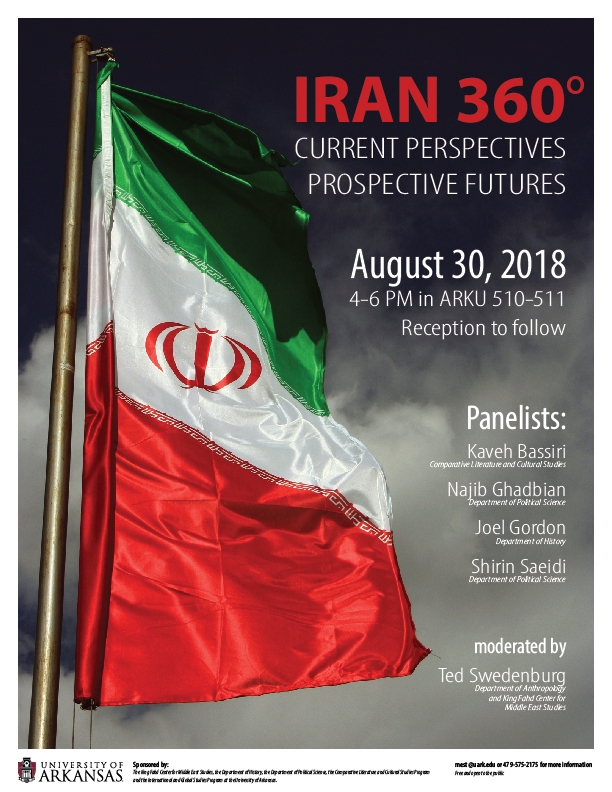
The King Fahd Center for Middle East Studies will host "Iran 360°: Current Perspectives, Prospective Changes," a forum featuring regional experts and Middle East Studies faculty. The forum will take place from 4-6 p.m. Thursday, Aug. 30, in the Arkansas Union Room 510-511 on the University of Arkansas campus.
Topics to be discussed include current Iranian perspectives on evolving political events in the country and abroad; human rights struggles in Iran today, with a focus on the status and strategies of women's rights activists; regional views on Iran from the Sino-Pak-Indo perspective; and developments in Sunni vs. Shia religious and political divides.
Attendees are invited to a reception to follow the event to meet Middle East Studies faculty, students and staff.
Panelists:
Kaveh Bassiri is a writer, translator, and doctoral candidate in comparative literature at the University of Arkansas, where he has taught a range of Iranian literature and film courses. His research and field work in Iran are primarily in contemporary poetry, film, and theater. His essays have been published in the Journal of Middle East Women's Studies, Iranian Studies, Michigan Quarterly Review, Film International, and Senses of Cinema.
Najib Ghadbian, associate professor of political science, has contributed political commentaries to several U.S., European, and Middle East media outlets. He has published articles in English and Arabic in several journals including: New Political Science, Middle East Journal, Middle East Review of International Affairs, and al-Mustaqbal al-`Arabi. Ghadbian's research interests include democratization and leadership in the Arab world, Syrian politics, Islamic movements, and US-Mideast relations.
Joel Gordon, professor of history, is a political and cultural historian of modern Egypt and the Middle East. He teaches and writes about political change, the intersection of public and popular culture, historical memory and nostalgia, and religious and secular cross-currents, with emphases on cinema, music and mass media. Gordon also hosts Nadi Cinema, a film series at the U of A that screens movies from across the Middle East over a variety of genres.
Shirin Saeidi, assistant professor of political science, is a citizen of both Iran and the United States and is one of the few, if not only, American researchers to have been based at the University of Tehran for several years. Saeidi's research is interdisciplinary and revolves around her desire to understand how people's agency at the local level influences national and transnational politics in the Middle East. She is particularly interested in the political ramifications of citizenship structures in non-democratic settings.
Ted Swedenburg, professor of anthropology and program coordinator for the King Fahd Center for Middle Eastern Studies, has taught at the University of Arkansas since 1996. His first book was a study of popular memories of the 1936-39 revolt in Palestine. Swedenburg is currently teaching and writing about Middle Eastern popular culture, resistance, and ethnic movements.
This lecture is presented by the King Fahd Center for Middle East Studies, the Department of History, the Department of Political Science, the Comparative Literature and Cultural Studies Program, and the International and Global Studies Program at the University of Arkansas.
Learn more about the event on its Facebook page.
About the King Fahd Center for Middle East Studies:
The King Fahd Center for Middle East Studies is an academic and research unit in the J. William Fulbright College of Arts and Sciences at the University of Arkansas. An interdisciplinary and interdepartmental area studies center that offers diverse cultural, intellectual, and educational opportunities for the University of Arkansas community, the Center promotes research and teaching in interdisciplinary Middle East studies. The Center offers an undergraduate major in Middle East Studies through the Middle East Studies (MEST) Program and supports graduate studies in related departments with graduate assistantships, as well as summer language study, conference travel, and field research grants, and teaching and research by visiting scholars from affiliated universities and programs. More information about the King Fahd Center can be found at mest.uark.edu. For ongoing news, follow the Center on Facebook and Twitter.
Topics
Contacts
Nani Verzon, project/program specialist
Middle East Studies Program
479-575-2175,